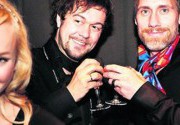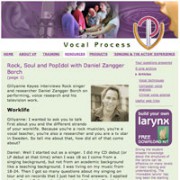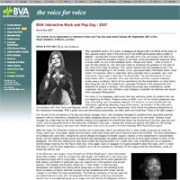Secret super team behind Anna’s slammin victory
/in Press /by zanggerArticle about Daniel Zangger Borch’s collaboration with Anna Bergendahl for the Eurovision Song Contest 2010
Text Martin Ekelund, Published on www.aftonbladet.se, 2010-02-28
Sweden’s new schlager darling
Daniel Zangger Borch, PhD in popular song (Ph.D. in musical performance)
 Anna Bergendahl has been assisted by Mattias Carlsson, who directed Rybak’s victory show in Eurovision last year, and Daniel Zangger Borch, Carola’s former vocal coach. Photo: PETER WIXTRÖM
Anna Bergendahl has been assisted by Mattias Carlsson, who directed Rybak’s victory show in Eurovision last year, and Daniel Zangger Borch, Carola’s former vocal coach. Photo: PETER WIXTRÖM
[2010-02-28]
Secret super team behind Anna’s slammin victory
MALMÖ. Anna Bergendahl surprised everyone and became this week’s slam. But behind the success lies a secret super team. – They have meant a lot for this performance, says Anna
With a pair of pink Converse, a guitar and a ballad about being herself Anna Bergendahl, 18, succeeded to convince the Swedish people to send her directly to the final in the Globe arena.
But what the viewers perceived to be a nice peformance by a rookie artist is, was in fact carefully directed by the record company Lionheart.
“Stood completely still”
Behind the success lies a team of Carola’s former vocal coach, Daniel Zangger Borch, director of Alexander Rybaks victory show – Mattias Carlsson – and one of the Eurovision’s most accomplished songwriters, Bobby Ljunggren.
– I think they have meant a lot for my performance. They have managed to pick up what I have deep inside me, says Anna.
Mattias Carlsson is in addition to Alexander Rybaks director also Norway’s Christer Björkman. In four months he worked to refine Anna Bergendahl’s number.
– He has had a huge impact on my development here during the week. In the first rehearsal, I stood perfectly still, hardly daring to move but he came up with something very unusual, she says.
And Mattias Carlsson is lyrical over Anna’s performance in Malmo.
– She is one of the most amazing people I’ve worked with. She is very unique. I think Sweden has a new baby, he says.
Daniel Zangger Borch, Doctor of popular song, has previously helped both Carola and Arash and Aysel, who finished third in last year’s Eurovision Final, with voice coaching. Now, he has worked with Anna Bergendahl for almost six years.
– Voice-wise, she has the best of Sarah Dawn Finer and Carola, he says.
Remembers nothing
In addition, Bobby Ljunggren, who has written the winning entries “Eternity” and “Hero”, is behind the song.
But despite the massive backing Anna Bergendahl could not believe her ears when she heard that it was her song that got the most votes and went straight to the final. It took several seconds before she realized it was her who Måns Zelmerlöw was talking about. And then everything is black.
– People say that I was dancing but I do not know what I did.
At the after party, she could finally relax and dance with her friends.
– It was a very tough week with a lot of hard work, pressure and nervousness. I have put huge pressure on myself because I wanted to do this so well.
Martin Ekelund
Published on www.aftonbladet.se, 2010-02-28
Rock, Soul and PopIdol with Daniel Zangger Borch
/in Press /by zanggerInterview with Daniel Zangger Borch
By Gillyanne Kayes, Published on www.vocalprocess.co.uk
Rock, Soul and PopIdol with Daniel Zangger Borch

Daniel Zangger Borch
Gillyanne Kayes interviews Rock singer and researcher Daniel Zangger Borch on performing, voice research and his television work.
Worklife
Gillyanne: I wanted to ask you to talk first about you and the different strands of your worklife. Because you’re a rock musician, you’re a vocal teacher, you’re also a researcher and you are a tv star in Sweden. So tell me about that, how did all of that come about?
Daniel: Well I started out as a singer. I did my CD debut (or LP debut at that time) when I was 18 so I come from a singing background, but not from an academic background like a teaching background. I was living on my music from 18-24. Then I got so many questions about my singing on tour and on records that I just had to find answers. I applied to the Royal College, the University of Music in Stockholm and they didn’t have any answers when I was attending their courses. So I thought no-one has any answers to my questions so I have to look them up myself. And that was how I came in contact with Johan Sundberg for the first time. I wanted to check out if we rock, pop and soul singers could benefit from the singer’s formant when we were singing live. That was my first question. And from that day I’ve been doing a lot of teaching and research, and singing less and less, but still doing it anyway.
Gillyanne: I wanted to ask you about this myth that rock and pop singers don’t need technique. Because you know when you read the magazines and the cultural stuff then in a way almost, to train you voice is the opposite to pop, and yet clearly you’re running your own voice centre. You must have a take on that.
Daniel: Yes, well I think that everyone can benefit from a good technique, but not all need the good the technique to accomplish what they want to do. That depends on what we mean by technique. Is it the ability to have a good stamina, or to sing an hour three days a week. Or is technique something that could strengthen your interpretation ability. In the interpretation ability, that kind of technique is always beneficial because you can never be too good at getting your phrasing or your text to the audience. You can never be too good to get your audience to feel something. Do you know what I mean?
Gillyanne: Absolutely.
Daniel: So that is a never-ending job. But if it’s technique that we’re talking about in the sense of being able to sing and not damage your voice, then some people don’t need it. Some people just sing, sing, sing.
Working on PopIdol
Daniel: I have some people right now, they don’t know anything about anything about voice. They’ve just sung. When I say they’re not in pitch, they ask me what’s pitch? And they’re in the top ten in this programme! So they can sing, but they cannot sing correctly from a technical point of view, but that doesn’t matter, because, so far, they are able to sing what they want to do in the amount they want to. So we’ll see about it in the long run. You never know. In the long run everyone sooner or later comes to the conclusion “I need something. I need to be more knowledgeable about my voice and my technique.”
Gillyanne: So you’re talking now about the tv show. Is it sort of like XFactor, Pop Idol, that sort of thing?
Daniel: It is Pop Idol in Sweden. I think with XFactor the only place to do it is the UK isn’t it?
Gillyanne: And what’s your experience been? Obviously you’ve talked about this particular group. What’s it like having to do that every week.
Daniel: Every week, three days a week. It’s fun because you can see all the results at once. I meet them Wednesday and we go through the song for 40 minutes, then I see them Thursday on stage with cameras and everything, you know, 20 minutes, and then I have choreography and camera – where the cameras are and stuff like that. And then we vocalise, we warm up and cool down, and on Friday it’s the same thing, and then we have a rehearsal, and then it’s live. In Sweden this is one of the top 5 of the biggest programmes, 1.3million I think.
Gillyanne: Wow, congratulations!
Daniel: That’s a lot in Sweden, we’re a small country. So the thing is then you can see the results from Wednesday in a live performance on tv on Friday and you’re like, how much could they take in of what I told them? And that’s not a lot!
Gillyanne: No, because they’re under enormous pressure aren’t they, in this kind of show.
Daniel: Enormous. So maybe 20% of what I’ve said. And I say the same thing on Wednesday, Thursday and Friday for 10 times, maybe. And then when the programme starts, 20% is still as we talked about. And 80% is gone! So my goal with this is (and I told them), in the end when you’ve done like 15 tv shows, then maybe we can have 80% that you can remember of what I’ve told you, and 20% that you forget.
Teaching Rock, Pop and Soul
Gillyanne: Interesting. Tell me a little bit about your work as a teacher. I’ve had a little bit of experience of some of your workshops. What’s your approach, is it different from a classical teacher, for example, or are there similarities?
Daniel: I think what we do as pop teachers is more like short-term. You can almost compare to a logopedie – what do you call it, speech and language pathologist. Because people come to me and they expect me to solve their problem or develop their abilities in maybe 3-10 sessions. And then it’s over. And then they come back next time they have a problem or something they want to fix. So I think that the rock/pop/soul teacher is more like a short-term problem solver or coach or what do you want to call it. And the classical music teacher has maybe more of a long-term voice building possibility. Sometimes they follow the students from 12 to 22, being a part of the family. And it’s every week. But in our world, it’s more like “can you fix me?”
Gillyanne: That’s very interesting. That’s been my experience with people from that world too.
Daniel: They still have a lot of ambition. That is the strange thing, They have a lot of ambition, they want to be really great and want to have success, and they want to work on it, but not in that way, and not only that. They can promote themselves or have makeup on for four hours, but they won’t sing for more than 20 minutes. Sing scales and that sort of thing.
Gillyanne: Yes. I understand.
Registers
Gillyanne: Now, I’d like to pin you down and ask you to talk about register. Because when I did your workshop, I felt that you gave a very clear and simple explanation. It’s such a confused world, the register world, isn’t it? Do you think it’s important for rock and pop musicians to have an understanding of register?
Daniel: Yes, I think so, because it’s so obvious that we use two different registers – in my opinion it’s very obvious. The difference between those two are so great that we have to know that everyone feels that there are two, in a way. And in between those two we don’t know if it’s separate registers, just a mix of registers, and how is it mixed, is it 20/80 or is it 60/40, 40/60. And if you want to give all those new ones a term, it would be impossible to sing a song. So for me I use only the two – chest register and falsetto register. Although I wanted to call chest register “vocalis register”. And maybe I’m going to try doing that. Because new research that Johan talked about showed what I thought a couple of years ago. That vocalis is not contracting in falsetto and thereby you can call the chest register the vocalis register instead because you can use it above the area where your chest bones are vibrating.
Gillyanne: It’s more physiologic to say…
Daniel: Yes it is, But it’s more pedagogical to say chest because everyone knows what it is. It’s easier, and you have to weigh those aspects against each other. I think that I had my pre-dissertation a couple of weeks ago. And there we talked about maybe we should try and say chest register with vocal closure, and without vocal fold collision (maybe you could say), or just vocal fold closure, because you can have a breathy chest, and the same for falsetto. You can have a closed falsetto and an open falsetto. So maybe that’s a way of not getting into to many new terms and still talk about the sound we have in between the outer chest and the outer falsetto.
Gillyanne: Yes, that’s very interesting, And female voice as well. You would use the word falsetto with your female singers also?
Daniel: Yes, I don’t do any difference between those, But they are still talking about head voice, some of them. I still use it. They use the voice in the same way, it’s just easier for them… maybe harder for them to feel the exact points of separation between the registers because their vocal folds are smaller and thinner.
Gillyanne: Yes
Daniel: So maybe that’s… but I still use the same, because they sing in the same way as we do. There’s no difference except for the pitch height. There’s no difference in how you sing a song in these genres – you sing in the same way. It’s easier of course for the male vocalist to feel the differences between the falsetto and chest, but I still use it. And then I use it with more or less core, more or less body to the tone, or volume sometimes. Of course you can sing in a loud falsetto too. But then you know that it’s falsetto. I’m still interested in the Estill terms too, but I haven’t found yet the best way to use it. They are so popular that you almost have to have some kind of translation into what we’re doing too.
Gillyanne: Yes, I think speaking personally that work needs to be done to relate what those descriptors of voice quality might mean in relation to register and if for instance some voice qualities can be produced on more than one register which has been my pedagogical experience. So yes, there’s work to be done. That’s why we do our research, isn’t it?
Daniel: Yes it is.
Gillyanne: In terms of defining, I like chest and falsetto or vocalis and falsetto, because that’s something we are quite clear on as researchers and we also feel it in our voice.
Daniel: It’s pretty clear. And you don’t have to go through all the … what I think is, it should be easy to coach. In our environment when I talk about that 3-10 sessions, you don’t have 10 sessions to explain the methodology to create certain sounds. So you have to work with what you hear straight away. And then you have to have a language that the students can relate to. “There are two large differences in these registers, and now you are singing in falsetto, can you do that a little, little louder?” Then I don’t have to say anything else. So it’s pretty easy and so we don’t have to know each other and go into a whole methodology.
Gillyanne: Yes, that makes perfect sense to me.
Daniel: But that is from teacher to student. Of course, we teachers could talk to each other in another way. That’s another road.
Gillyanne Kayes
Publicerad på www.vocalprocess.co.uk




